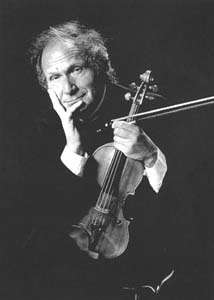Estonia Pärnu (Concert Hall) 08/02/2011 - Johann Sebastian Bach: Concerto for Two Violins and String Orchestra in D Minor, BWV 1043 Erkki-Sven Tüür: Action.Passion.Illusion Aaron Copland: Suite from “Appalachian Spring” for 13 Instruments Fritz Kreisler: Liebesleid – Schön Rosmarin Antonio Vivaldi: Concerto for Four Violins and String Orchestra in B Minor, Op. 3, No. 10 |
Ivry Gitlis and Friends |
Estonian National Youth Chamber Orchestra, Paavo Järvi, Naoki Tokuoka, Martin Sildos, Edward Farmer, Rachel Grubb, Jie Li, Antoine López, Kaspar Mind, Florian Donderer (Conductors)  Ivry Gitlis (Courtesy of the Artist) |
Israeli-born Gitlis is a much-revered figure, legendary as one of the 20th century’s greatest violinists. Though slower now walking on and off the stage, there was nothing diminished in his musicianship or his ability to communicate a musical message. He took his place in the Vivaldi with violinists Tatiana Berman, Miina Järvi, and Mari-Liis Päkk in a May-December demonstration unique to behold. It had propulsion and finesse, neither stylistically baroque nor romantic, but something in between, a kind of meeting of personalities that made its case and proved satisfying to the crowd. At the conclusion, Gitlis kissed each soloist’s hand and blew kisses to Järvi on the podium. In the Bach Double Concerto, Gitlis partnered with a different violinist in each movement: Mari-Liis Uibo in theVivace, Anna-Liisa Bezrodny in the Largo and Triin Ruubel in the Allegro finale. Of the three, Bezrodny was the most successful in conforming her sound and interpretation to his, though stylistic differences ultimately mattered little. There were flowers for all as they returned to the stage to share a corporate bow. The Conducting Academy students performed successive movements of the Tüür and Copland, each approaching the podium and taking over from the previous conductor without losing a beat. Naoki Tokuoka of Taiwan opened the concert with Tüür’s Action, giving the music a visual dimension with baton-less boxing and corkscrew gestures. Estonian Martin Sildos followed him, stealing into Passionalmost noiselessly. The movement, written in Tüür’s earlier, Arvo Pärt-influenced style, bears comparison to Samuel Barber’s Adagio for strings, and Sildos built it to almost unbearable intensity. Edward Farmer of the U.K. crafted Illusion with strong, emphatic beats, bringing the work to a fully-rounded conclusion. The three conductors called Tüür, who lives on Hiiumaa Island off the coast of Estonia the Baltic, to the stage for a bow. Appalachian Spring was led by, in order, Rachel Grubb (U.S.A.), Jie Li (China), Antoine López (U.S.A.), Kaspar Mind (Estonia) and Florian Donderer (Germany). Each invested life and color into the music and yielded the baton smoothly to her/his successor. It was Gitlis, however, who made the evening unforgettable. He played two pieces by Kreisler, Liebesleidand Schön Rosmarin, treating each with the utmost affection. He worked hand-in-glove with Järvi, approaching the podium for close communication and bending each piece with sly ritards and lifts of the bow, as if inviting a conversation with his listeners. Järvi accomodated every nuance, beaming smiles at both Gitlis and the audience. In response to rhythmic clapping and a standing ovation, Gitlis played the second movement of Bach’s Violin Concerto in E Major. He played it slowly and beautifully, seeming to suspend time, prompting a second encore:Liebesleid redux and rarefied. Mary Ellyn Hutton |

